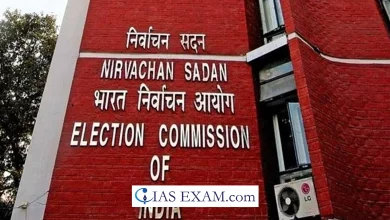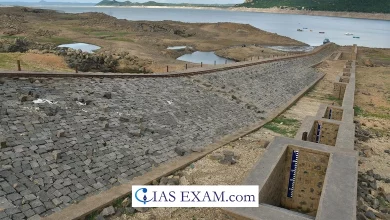Environmental Federalism and its importance in Climate Action
GS Paper 3 - Environment and Ecology, Climate Change

Context
The dialogues surrounding Climate Change have forced the nations to develop their national action plans to mitigate the impact. But within this discourse lies to crucial realities that are needed to be recognised.
First, countries in the Global South encounter disproportionately greater challenges from climate change. Second, India has emerged as a torch-bearer in global climate justice debates, leading the way in formulating national action plans. However, on the domestic front, our quasi-federal climate policy structure harbors internal contradictions, where states shoulder the responsibility of implementing most targets amid constraints posed by limited resources and shrinking space in environmental policymaking.
India’s Environmental Stewardship
- India’s environmental stewardship can be traced from its legislations and judicial journey of embracing environmental constitutionalism.
- This encompasses both the rights and duties of the state and individuals. Initially, the Constitution did not explicitly address environmental governance.
- However, the 42nd constitutional amendment in 1976 altered the jurisdiction over forests and wildlife, transferring them to the Concurrent List. The 73rd amendment assigned panchayats the responsibility for environmental protection and conservation.
- Subsequent legislations have further solidified this framework. However, a consistent trend across these developments has been a shift towards centralisation in legislative jurisdiction over environmental laws, while mandating greater decentralization to states in implementation.
Challenges in State Governance
- Climate change issues are witnessed more prominently at regional and state level compared to their aggregate impact nationally. While the legislative frameworks rightfully allocate greater responsibilities to the lower tiers of government, the challenge has been their relative marginalization in resource access and decision-making processes.
- Most state functions and powers with respect to natural resources require central approval, relegating states to mere implementation roles. These functions include developing forest management plans, diverting forest land etc.
- Recent changes in regulations of the mining sector have reignited the debate on resource federalism. This trend is highlighted by the diminished autonomy of state governments in making decisions related to mining leases while vesting increased authority to the Centre over the utilization of funds of the District Mineral Funds.
- The 2020 draft notification of the Environmental Impact Assessment authorized the Centre to appoint members of the State Environment Impact Assessment Authority (SEIAA), relegating the state governments to a mere recommending role. Consequently, as of February 2024, SEIAA appointments have been stuck for over three months due to the Centre’s rejection of state-recommended names.
- Some State Action Plans for Climate Change (SAPCCs), developed in alignment with national strategies, are formulated without adequate local community engagement, resulting in a lack of institutionalization, defined targets, and sufficient financial investment.
Fiscal Federalism Imbalance
- The Centre’s fiscal prowess reinforces its structural dominance with states tasked with implementation, while a major chunk of the tax revenue is collected by the Centre.
- The erosion of state tax autonomy following GST reforms has not been offset by increased non-shareable revenue, further strengthening the Centre’s position.
- India’s National Environment Policy of 2006 emphasizes decentralization as a means to empower local authorities in addressing environmental issues, highlighting the need for greater state involvement in crafting comprehensive climate policies.
Measures to be Taken
- All state governments must reform their SAPCCs and policies along with formulating dedicated climate budgets akin to the initiative taken by the Odisha government.
- A greater involvement of the local government, and hence the local communities like farmers and tribals, shall promote more relevant and efficient environmental policymaking tailored to each state’s unique needs.
- Need to bolster fiscal federalism for environmental federalism and to yield positive and sustainable outcomes.
- Intergovernmental transfers that recognise environmental improvements can incentivise states and local bodies further.
- There must be more national-level efforts to enhance India’s effectiveness in combating climate change. A nuanced delegation of powers and resources to state governments is essential to empower them in this endeavor.
Way Forward
Addressing the complexities of India’s climate governance requires a multifaceted approach that balances centralization and decentralization while ensuring equity and justice. Immediate reforms, coupled with long-term structural changes in fiscal federalism, are necessary to enhance India’s role in mitigating climate change and promoting sustainable development.
SOURCE: The New Indian Express





.png)



